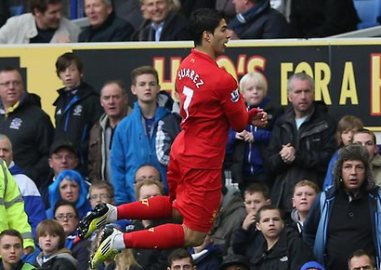 The signs suggest that Suarez will be leaving Liverpool in the summer. This transfer saga follows the trend that seems to happen on an annual basis now.
The signs suggest that Suarez will be leaving Liverpool in the summer. This transfer saga follows the trend that seems to happen on an annual basis now.
The player gives an interview in his native country which suggests he wants to leave, the player backtracks and claims that the quotes were mistranslated or taken out of context, bids then come in for rival clubs at a ridiculously low price which steadily go up and up until the player is sold. The main objective for Liverpool right now is to get as much money as possible for the Uruguayan – or is it?
Another important consideration is who to sign as a replacement for Suarez. When you have such a huge void appearing in the team it’s vital to identify the right target and be sure that he will fit into the team almost seamlessly. When you look at Liverpool’s forward line and see Daniel Sturridge, Iago Aspas and Fabio Borini it becomes clear that a replacement for Suarez will need to be bought to ensure that he won’t be missed.
In order to emphasise my point on the importance of replacing a key player, and why it is especially important for Liverpool, I’ll have a look at previous big money transfers and how the club dealt with the money that they were given. The Merseysiders don’t have a great track record in this department, so what they do with the £50,000,000+ they hope to receive for Suarez is crucially important.
Alonso and Aquilani
Following a second placed finish the season before, big things were expected of Liverpool in the 2009/10 season. The sale of Xabi Alonso to Real Madrid meant Liverpool had to find a replacement for the deep lying playmaker and they needed someone who could make an instant impact, given the key role that the departed Alonso had. In signing Alberto Aquilani, they made 3 mistakes. Firstly, they signed a player who was injured; and thus unable to immediately contribute to the team. Secondly, Aquilani had never played in England and needed time to adapt to the culture and playing style; again making him unable to make an immediate contribution. Thirdly, Aquilani was a different type of player to Alonso – he played further forward and wasn’t as comfortable coming deep to collect the ball. What Liverpool needed was a player who could perform a similar role to Alonso and could slot seamlessly into the team. Aquilani wasn’t that player. The result? A 7th placed finish from the team that some pundits were backing to win the title.
Torres and Carroll
The transfer dealings of the 31st January 2011 will go down in Premier League history. Almost out of the blue, Chelsea came in and snapped up Liverpool forward Fernando Torres for £50,000,000 – a British transfer record. Despite already having signed Luis Suarez in the transfer window, Liverpool felt the need to instantly replace Torres and spent £35,000,000 on Newcastle’s Andy Carroll. Not only was Carroll injured at the time (which begs the question why they didn’t wait until the summer to make the purchase) but he had only half a season of Premiership experience. Despite Liverpool’s insistence that they had been interested in Carroll for a while, the transfer came across as a kneejerk reaction and Carroll’s performances did nothing to dispel that image.
The cruel irony for Liverpool is that if you want to look at an example of how to deal with this properly, you just look at how Newcastle replaced Carroll.
Carroll and Ba
The club were put in a similar situation to Liverpool, their star striker was sold for huge money on deadline day, yet they reacted differently. They chose to bank the money and take the time to identify the correct player; signing Demba Ba in the summer. On a free, no less. You don’t have to spend most of your money to get the right player. His 16 goals in the 2011/12 season compared to Carroll’s 9 gives an indication of what benefits can be reaped from taking the time to make a signing.
Given the set style that Rodgers has Liverpool playing, it’s vital for any new signing to be able to play in the system that is in place. This may actually prove beneficial for the club, with a certain way of playing it could be easier to identify the right type of player. It’s clear that an Andy Carroll-type player has no place at the club and wouldn’t even be under consideration as a transfer target. The only question is who they could sign. Considering that they need a top quality player to replace Suarez and that they aren’t currently in the Champions League, the number of options available must be slim at best.
Arguably Spurs are currently having to deal with a similar issue. With Gareth Bale’s transfer to Real Madrid looking more and more inevitable they are faced with filling a huge gap in their team. Towards the latter end of last season especially, Spurs resembled a one man team; such was the influence Bale had. With the signings of Paulinho and Roberto Soldado, the team has definitely been strengthened over the summer but the questions remains if they need another player to ensure that the Welshman isn’t missed. In the wide areas the team seem very weak, especially since Bale moved more centrally, and a good quality wide player could just be what they need.
Despite the obvious importance in getting the maximum amount of money possible for a player when he is set to be transferred, it cannot be forgotten how important it is for a good replacement to be bought. Liverpool need only look at their recent transfer dealings to realise that for all the money that Suarez is worth, he may as well leave on a free if they reinvest all his transfer fee on a complete flop.
Follow Myself and Soccerisma on Twitter: FanaticNeutral and Soccerisma
Suarez's Sale Raises Issues for Liverpool
(Visited 66 times, 1 visits today)
 Premier League
Premier League La Liga
La Liga Bundesliga
Bundesliga Serie A
Serie A Ligue 1
Ligue 1 UCL
UCL




What a perlava